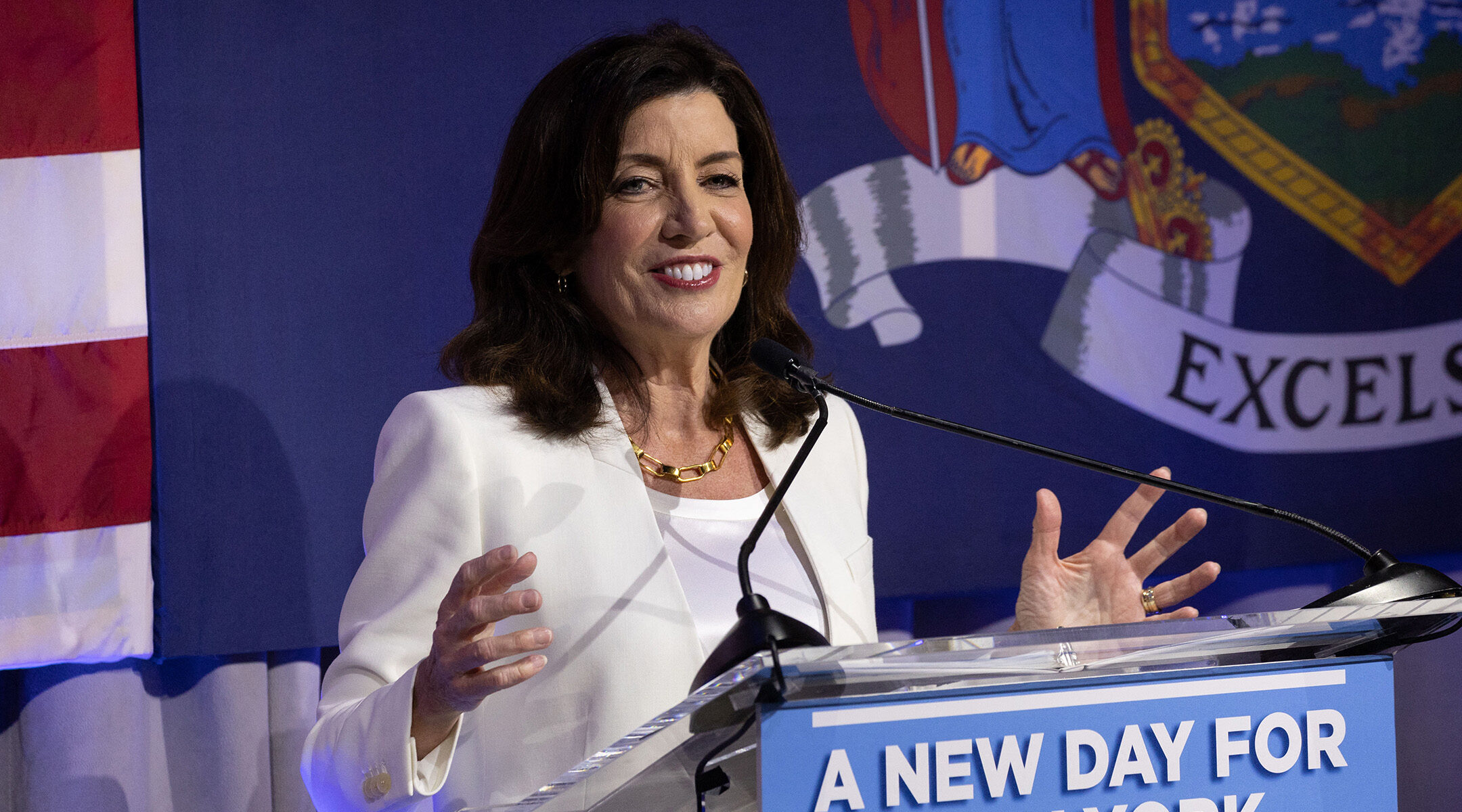(New York Jewish Week) — Rep. Lee Zeldin, the Jewish Republican from Long Island, will face New York Gov. Kathy Hochul in her bid for her first full term in November.
Zeldin, one of two Jewish Republicans in the House of Representatives, beat three other hopefuls in Tuesday’s primary, including former mayor Rudy Giuliani’s son Andrew, with 44 percent of the vote.
Should Zeldin defeat Hochul in the upcoming election, he would become the first Jewish Republican governor of New York. Zeldin was one of 100 House Republicans who voted against certifying President Joe Biden’s victory, but said his campaign will focus on issues like crime, affordability, schools and Hochul’s record.
“She’s in over her head,” Zeldin said of Hochul in a speech after securing the nomination. “She’s a walking identity crisis, to be honest.”
Hochul, who became governor in 2021 after Andrew Cuomo resigned amid allegations of sexual harassment, beat back challenges by progressive Public Advocate Jumaane Williams and conservative Democrat Tom Suozzi, easily defeating both with over 67 percent of the vote.
She would be the first female governor in New York elected to a full term should she be elected.
“I stand here because of the generations of women before me, who banged up against glass ceilings,” she said in a speech on Tuesday night. “To the women of New York, this one is for you.”
Her path to securing the nomination seemed breezy. She gained endorsements from Jewish communities that included Hasidic Williamsburg, the fractured Satmar community and Jewish leaders from the Long Island enclaves of the Rockaways and Five Towns.
Her choice for lieutenant governor, Antonio Delgado, who took the position after his predecessor Brian Benjamin was embroiled in an embezzlement scandal, also secured the nomination, easily defeating progressive activist Ana De Maria Archila, who had the support of Rep. Alexandria Ocasio Cortez and former Council member Diana Reynes.
Delgado, whose wife is Jewish, also received broad support from the Jewish community during the campaign.
Republicans nominated former New York City Police commander Alison Esposito for lieutenant governor.
Hochul campaigned as a fighter for women in the wake of a Supreme Court ruling overturning Roe v. Wade. She also implemented stronger gun control measures after 13 people were killed in a racist mass shooting in Buffalo.
She came under fire by both the progressive wing of her party and Suozzi during the election for adding a $1.3 billion stadium for the Buffalo Bills as part of this year’s state budget, which includes $850 million from public funding.
In her speech on Tuesday, she focused on far-right extremists and doubled down on her support of women’s rights.
“We cannot and will not allow the extreme right to roll back the progress we’ve made, whether it’s a Trump cheerleader running for Governor of our State, or a right-wing majority sitting on the highest court in the land,” Hochul said.
In other races, Pinny Ringel was elected district leader of the 48th Assembly District in Brooklyn, ousting incumbent David Schwartz. New York City Mayor Eric Adams backed Ringel, reportedly burned that Schwartz supported businessman Andrew Yang in last year’s mayoral primary. Ringel ended up winning the race by just 37 votes — also beating back a challenge by Heshy Tischler, an Orthodox Jewish activist who led sometimes violent protests against city COVID restrictions. Tischler ended up with 5 percent of the vote.
In another Brooklyn race, Emily Gallagher, a progressive who was backed by the United Jewish Organization of Williamsburg, a Satmar body, steered clear to reelection.
Assemblymember Deborah Glick, New York’s first openly gay state legislator and a Jew, fought off a primary challenger to win her primary in Manhattan for District 66, which includes Greenwich Village, SoHo, NoHo and Tribeca.
The New York Jewish Week brings you the stories behind the headlines, keeping you connected to Jewish life in New York. Help sustain the reporting you trust by donating today.





